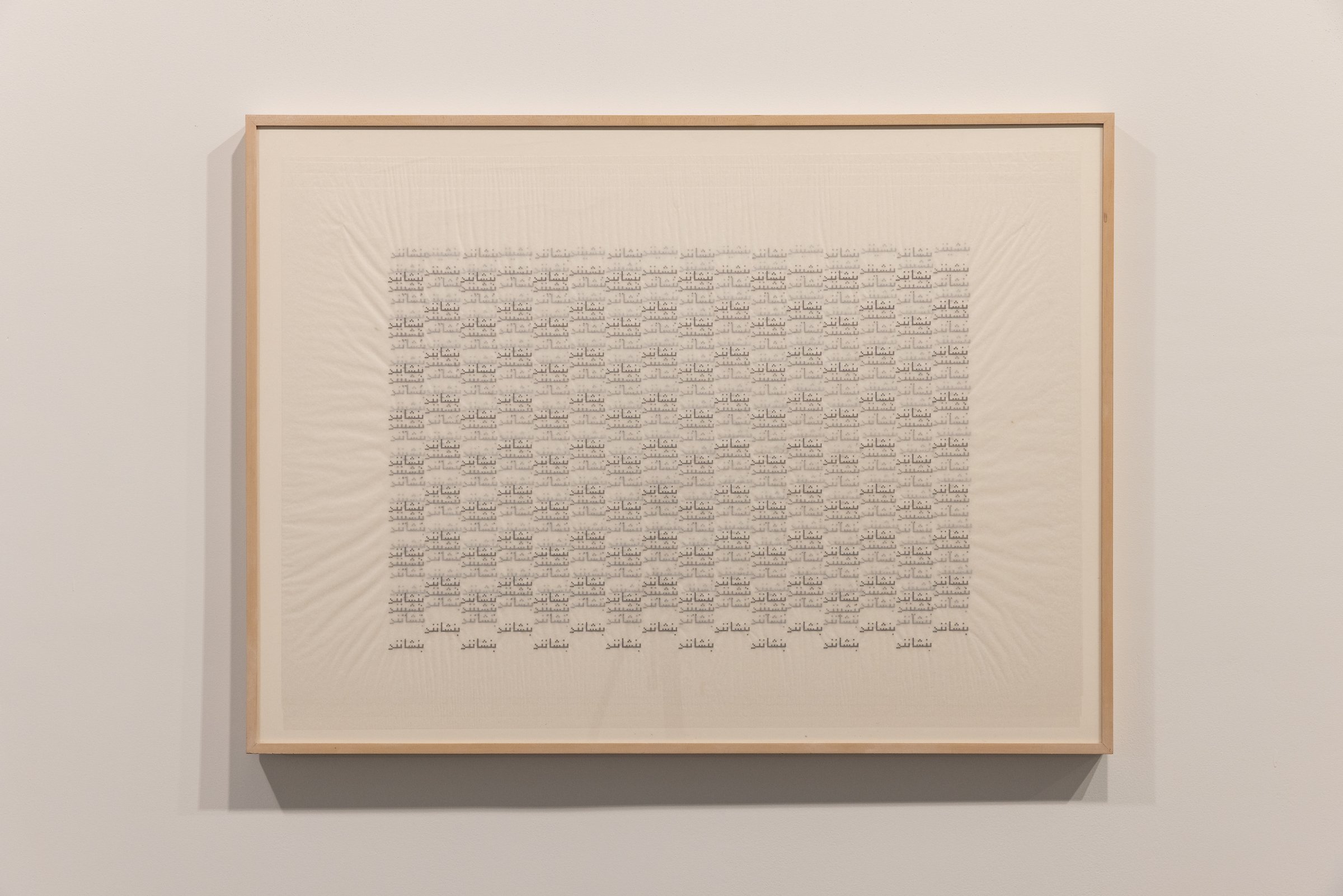Golnar Adili, She Feels Your Absence Deeply, 2021, 3.25 x 4.25 x 1.75 inches (closed), Publisher: Women’s Studio Workshop, Edition of 50. Photo by Alec Logan Smith
[Image Description: Detail of an unfolded artist’s book from a three-quarter perspective, printed with a blue airplane and a sepia eye. Twelve wooden blocks rest on top. Six are scattered, and the other six are aligned in a grid, depicting a woman in a black headscarf.]
Golnar Adili: Found in Translation:
A Story of Language, Play, and a Personal Archive
Mentor: Kevin Beasley
January 27 – February 26, 2022
Closing Reception
Saturday, February 26th, 5–7pm
Golnar Adili Artist Talk
Co-hosted with Center for Book Arts
Friday, February 25th, 6:00–7:30 pm ET
Watch the recording here
CUE Art Foundation is pleased to present Found in Translation: A Story of Language, Play, and a Personal Archive, a solo exhibition by Golnar Adili, mentored by Kevin Beasley. Adili’s work is a formal investigation of language, spanning 14th century Persian poetry, didactic Iranian texts, and the artist’s own family archives. Featuring artist books, photographic and textual prints, and an installation of modular wooden sculptures, the exhibition embodies a multidisciplinary exploration of diasporic identity.
Born in Virginia, Adili migrated with her family to Tehran as a young child in 1979 in the wake of the Iranian Revolution. Her father, a leftist writer and activist, was forced into exile soon after their arrival, and eventually escaped back to the U.S. in 1981. Adili remained in Iran with her mother, whose multiple attempts at immigration were unsuccessful. Forced to live apart for many years, they kept in touch through letters and photographs sent back and forth – materials that now make up a vast archive of separation and longing. By reactivating these materials in layered prints and artist books, Adili transforms distilled memories into living artworks.
In She Feels Your Absence Deeply, a portfolio box unfolds to reveal a set of wooden cubes printed with images from the archive: the artist as a child with her father, her mother’s passport, a pink letter from one parent to another. As the blocks are flipped and moved around, the images fragment into mix-matched pieces. Inspired by children’s puzzle books, the work invites a return to – and reimagining – of play.
This tactile playfulness is echoed in Adili’s floor installation in the main gallery space, where verb pairings from a 14th century Persian poem come to life in an undulating landscape of wooden blocks. The poem, “Samanbouyan,” written by the lyric poet Hafez, is a recurring point of departure in Adili’s work. She is particularly occupied by the first verb pairing, benshinand and benshaanand, meaning “to sit” and “to seat.” Repeating throughout “Sambouyan,” verb pairings serve as the central structure for the poem. Each pair is similar in form, but often contradictory in meaning – a tension that Adili makes tangible through iterative material explorations. In the graphite drawing Sambouyan, Adili’s first piece investigating the poem, the opening verse is transcribed in a pixelated typography. As the verse reaches its end, the verbs repeat, cascading down in criss-crossing columns. The resulting hourglass shape serves as a model for Adili’s installation at CUE, which translates the rhythm of language into a spatial experience.
A striking image of eyes, belonging to the artist’s mother, stares back at us from multiple pieces throughout the gallery: printed into gridded fragments on toy wooden blocks, or interwoven with an image of the artist’s chest. As Beasley writes in the accompanying exhibition catalogue, “the biographical current within each image, script, or form maintains its autonomy as a lived experience, point of departure, and memory of her own body – all while being opened up, revealed, and transformed. The unfolding of a puzzle is not just a metaphor for the unfolding of a memory, but is in its own right the revealing of a shared language within ourselves. The modularity of form possessed by Adili’s objects captivate the imagination and perpetuate a curiosity about who we are, where have we come from, and where are we going.”
Golnar Adili, My Mother’s Eyes Woven Into my Chest, 2018, Two transfer prints woven, 17 x 20 inches
[Image Description: Two black and white photographic prints, one a pair of eyes, and the other a bare chest, have been cut and woven together.]
Golnar Adili is a mixed media artist, educator, and designer with a focus on diasporic identity. She holds a master’s degree in architecture from the University of Michigan and has attended residencies at the Rockefeller Foundation for the Arts (Bellagio, Italy), Center for Book Arts (NYC), Smack Mellon (Brooklyn, NY), Fine Arts Work Center in Provincetown (MA), MacDowell Colony (NYC), Ucross Foundation for the Arts (Clearmont, WY), Lower East Side Printshop (NYC), Women’s Studio Workshop (Rosendale, NY), and Lower Manhattan Cultural Council Workspace (NYC), among others. Adili has shown her work internationally; venues include: the Victoria and Albert Museum (London, UK), NURTUREart (Brooklyn, NY), Craft and Folk Art Museum (Los Angeles, CA), and International Print Center New York (NYC). She has received several grants, including the Pollock-Krasner Foundation grant, NYFA Fellowship in Printmaking/Drawing/Artists Books, and the Jerome Hill Finalist Grant. Adili is a Jameel Prize finalist. Her artist books are in several collections, including the Library of Congress, Rutgers University, Yale University, and University of Michigan.
In addition to her exhibition at CUE, Adili’s work is on view at Center for Book Arts (28 West 27th Street, 3rd Floor) in Father Gave Water/Baabaa Aab Daad: An Homage to Childhood, Persian, and Process, January 14 – March 26, 2022.
Kevin Beasley (b. 1985, Lynchburg, VA) is a New York-based artist who transforms materials of cultural and personal significance into sculptures, site-specific installations, and sound-based performances. His work acknowledges the complex, shared histories of the broader American experience, steeped in generational memories. A selection of recent exhibitions, installations, and performances include Prospect.5, New Orleans (2021); Performa 2021 Biennial, New York, NY; The Dirty South: Contemporary Art, Material Culture, and the Sonic Impulse, Virginia Museum of Fine Arts, Richmond, VA (2021); Grief and Grievance: Art and Mourning in America, New Museum, New York, NY (2021), A4 Arts Foundation, Cape Town, South Africa (2020); Whitney Museum of American Art, New York, NY (2018-2019); and The Studio Museum in Harlem, Morningside Park, NY (2016). Beasley’s work is included in the collections of The Museum of Modern Art, New York, NY; Art Institute of Chicago, IL; Solomon R. Guggenheim Museum, New York, NY; Dallas Museum of Art, TX; Minneapolis Institute of Art, MN; Pérez Art Museum Miami, FL; Tate, London; San Francisco Museum of Modern Art, CA; Institute of Contemporary Art Boston, MA; Blanton Museum of Art, Austin, TX; The Studio Museum in Harlem, New York, NY; Hammer Museum, Los Angeles, CA; and Whitney Museum of American Art, New York, NY; among others.
The exhibition is accompanied by a 32-page color catalogue, with texts by Golnar Adili, Kevin Beasley, and Emily Chun. The catalogue is be available online and free of charge to gallery visitors.
Exhibition Materials
Catalogue essay: "Translatory Gestures" by Emily Chun
Press
Dina Ramadan “Golnar Adili’s “Foundation in Translation: A Story of Language, Play, and a Personal Archive,” Art Agenda, February, 2022.
Megan N. Liberty, “One Work: Golnar Adili’s “She Feels Your Absence Deeply,” Art in America, March 2, 2022.
Images
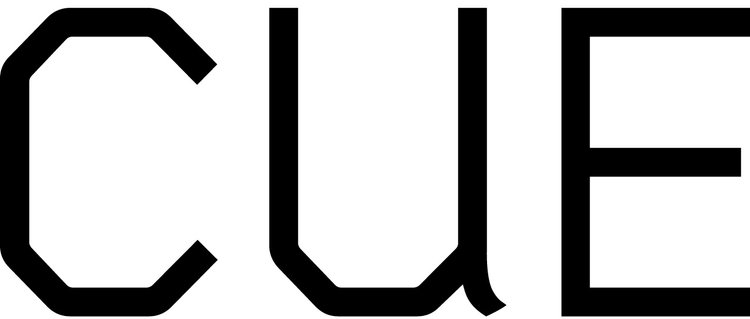
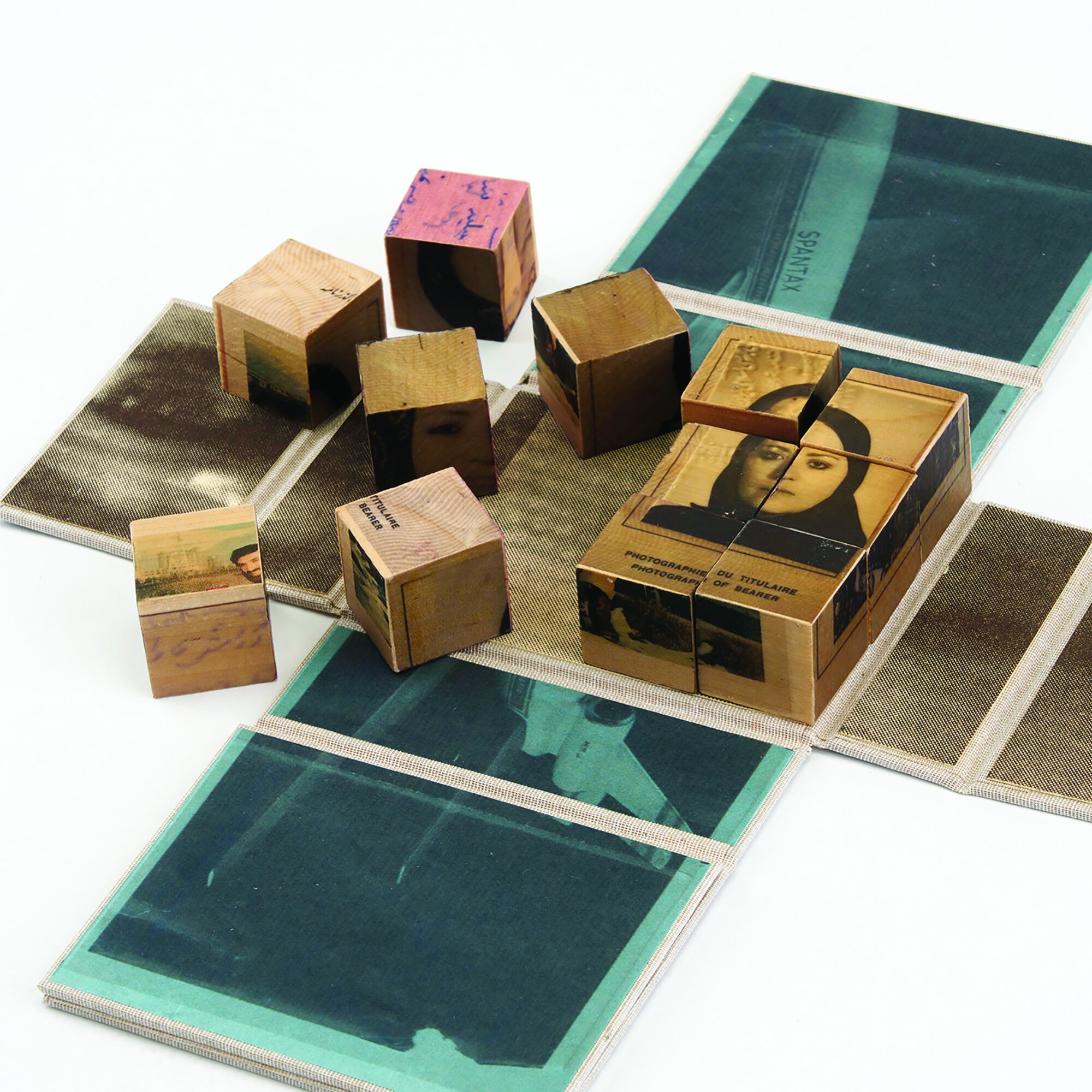

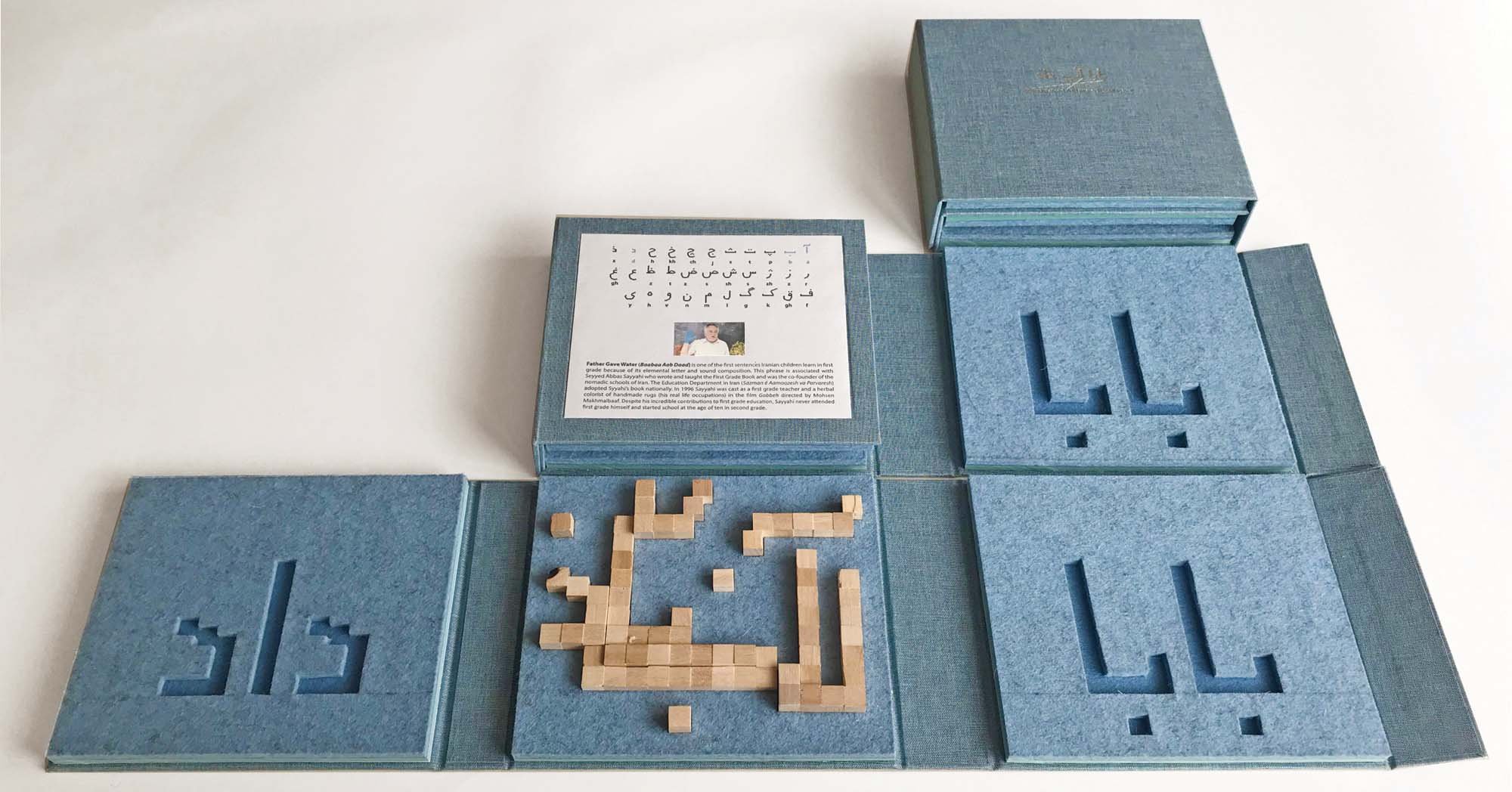
![Samanbouyan , 2008, Graphite on paper, 24 x 36 inches [Image Description: On a sheet of white graph paper two Persian words rendered in a pixelated typography repeat in criss-crossing columns, forming an hourglass shape.]](https://images.squarespace-cdn.com/content/v1/51f13e79e4b0799d35dfa1a8/1639862262483-ESRH5UDNZIGARN7AOWHK/Golnar+Adili_7_Samanbouyan_300dpi.jpg)

![They Seat (Benshaanand) , 2015, Silk Screen on four layers of lens paper, 24 x 36 inches [Image Description: Persian text in a dark gray pixelated font is repeated in a checkerboard pattern on a white background.]](https://images.squarespace-cdn.com/content/v1/51f13e79e4b0799d35dfa1a8/1639862269187-WAJOX3JCMBJ8G9667YSR/Golnar+Adili_10_They+Seat_300dpi.jpg)
![They Quarrel (Bestizand) , 2015, Silk Screen on two layers of lens paper, 24 x 36 inches [Image Description: Persian text in a pixelated font of varying grays repeats in a pattern of zig-zag diagonal lines on a white background.]](https://images.squarespace-cdn.com/content/v1/51f13e79e4b0799d35dfa1a8/1639862271354-B2HHLGFIJDWV6R0KV0EO/Golnar+Adili_11_They+Quarrel_300dpi.jpg)
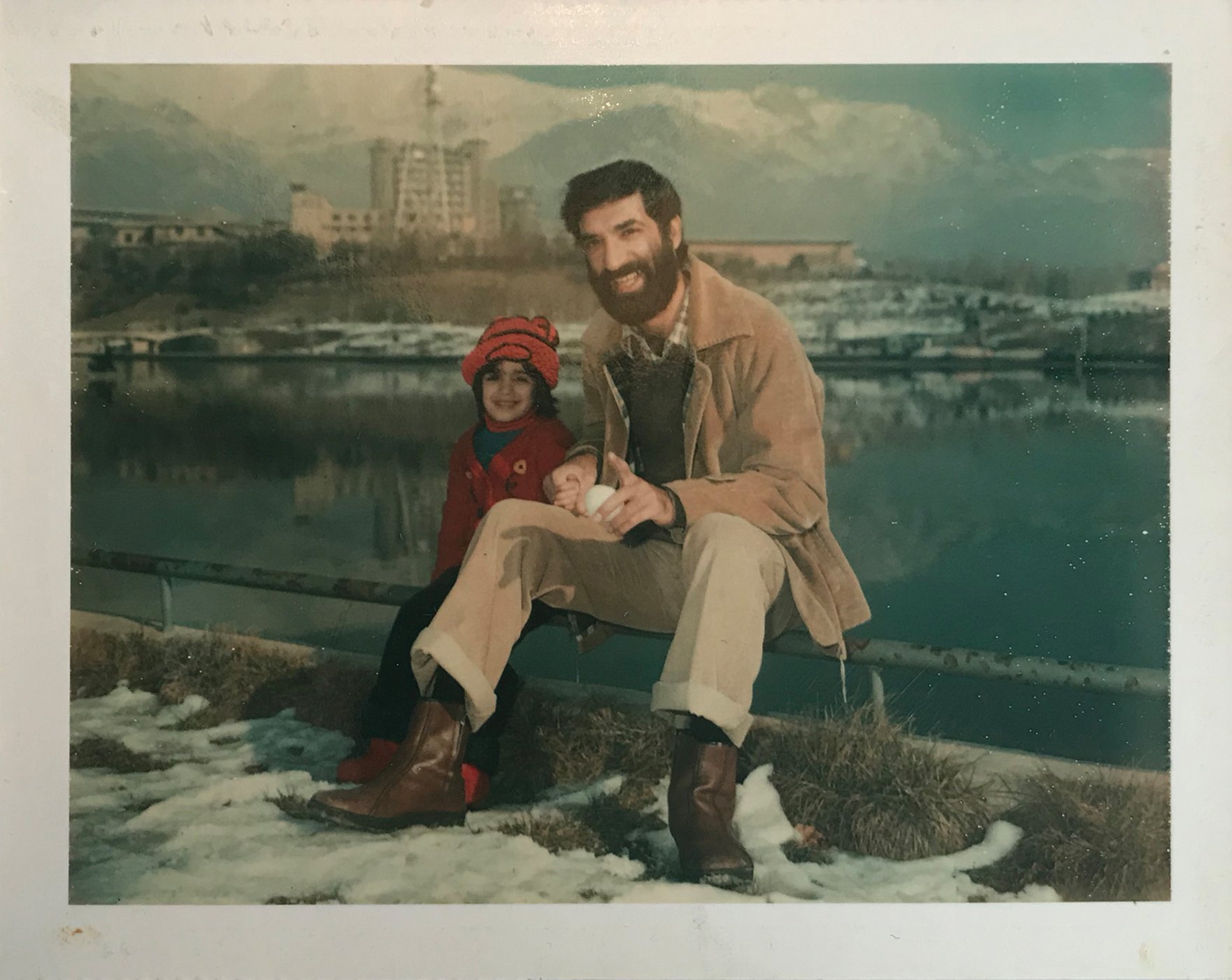


![My Mother’s Eyes Woven Into My Chest , 2018, Two transfer prints woven, 17 x 20 inches [Image Description: Two black and white photographic prints, one a pair of eyes, and the other a bare chest, have been cut and woven together.]](https://images.squarespace-cdn.com/content/v1/51f13e79e4b0799d35dfa1a8/1645313222226-UY5DUJLWOKSUDU4QGCFK/Golnar+Adili_22_My+Mother_s+Eyes+Woven+Into+My+Chest_300dpi.jpg)








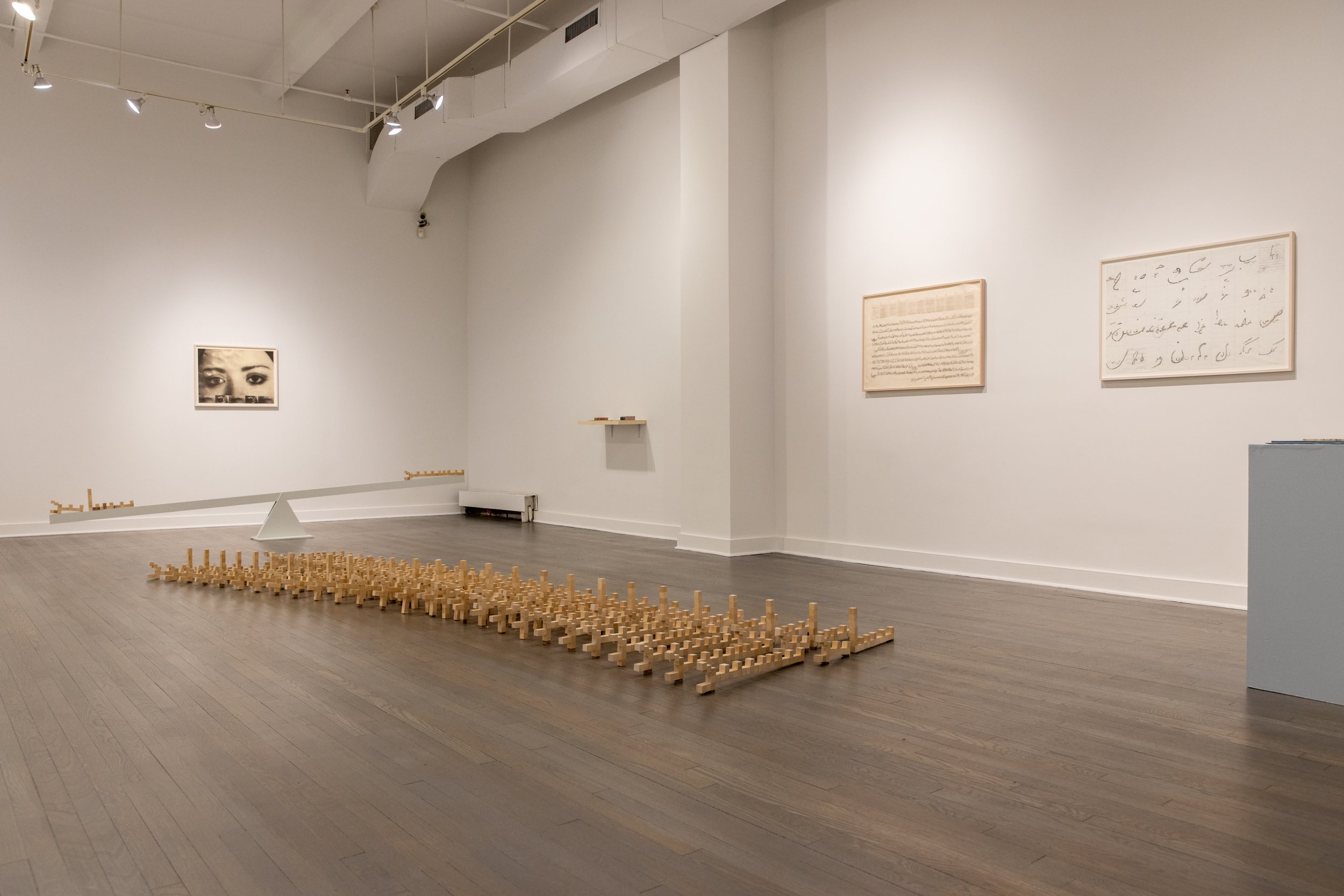


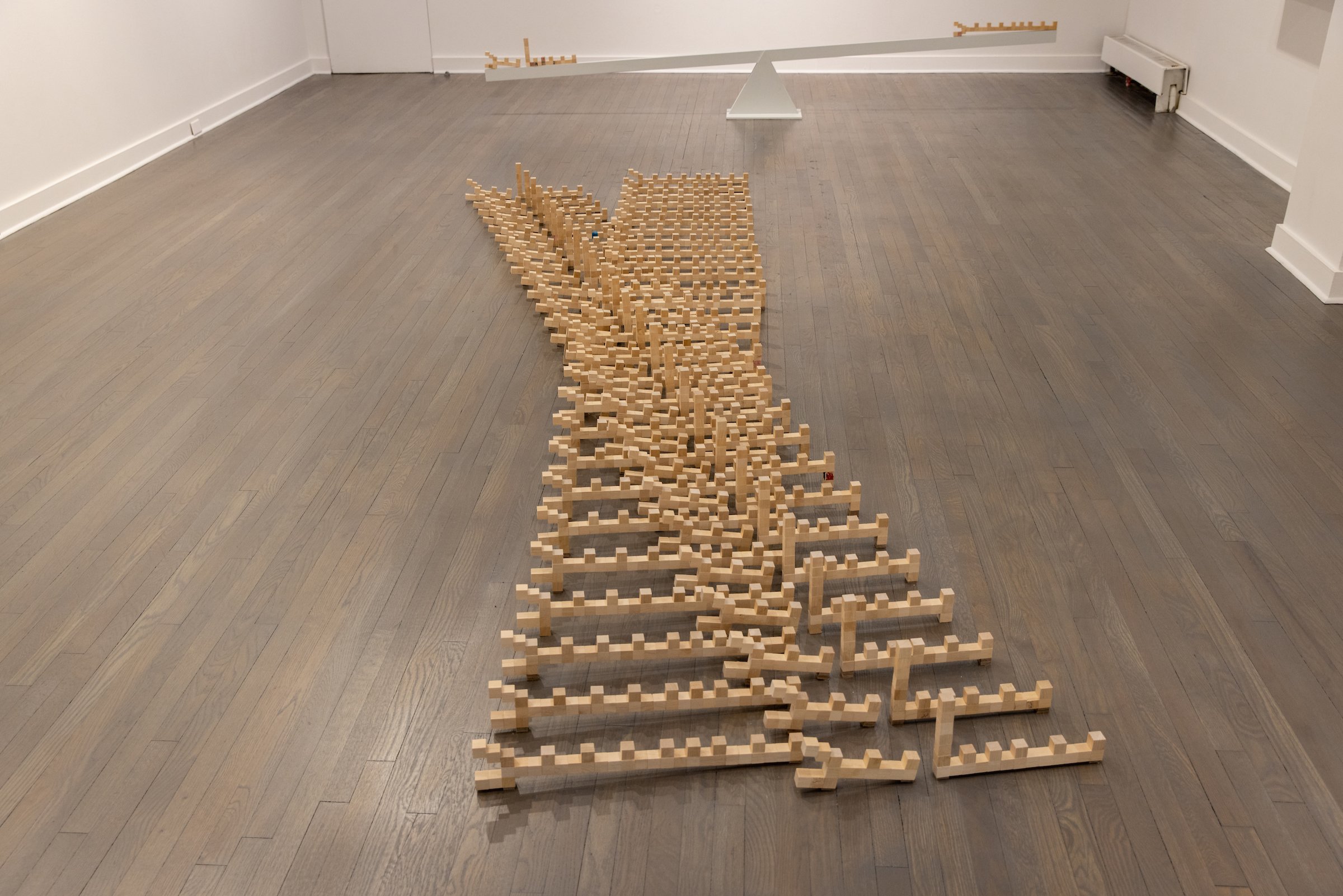

![Installation view of Golnar Adili: Found in Translation: A Story of Language, Play, and a Personal Archive. Photo by Walter Wlodarczyk. [Image description: A detail of a large floor installation made of wooden blocks.]](https://images.squarespace-cdn.com/content/v1/51f13e79e4b0799d35dfa1a8/1645566360114-BJ55DRZHNK4M9R9EMSLU/Install+Image+17_Golnar+Adili_CUE_Credit+Walter+Wlodarczyk.jpg)



